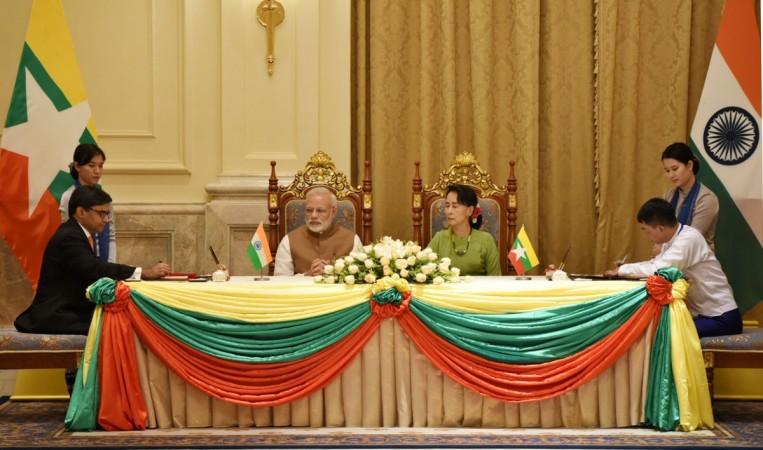
India on Wednesday shared its concerns with Myanmar over the situation in the country's Rakhine state where the army has launched a crackdown on the Rohingyas, triggering a mass exodus.
"We share your concerns about the extremist violence in Rakhine state and violence against security forces and how innocent lives have been lost," Indian Prime Minister Narendra Modi said in a joint address to the media along with Myanmar State Counsellor Aung San Suu Kyi following delegation-level talks between the two sides here.
"We hope that all stakeholders can together find a way out in which unity and territorial integrity of Myanmar is respected," Modi said. "At the same time, we can have peace, justice, dignity and democratic values for all."
Suu Kyi is under mounting international pressure to stop the alleged human rights violations against the Rohingyas, who are denied citizenship in Myanmar.
Thousands of Rohingyas are crossing over into Bangladesh -- where they are sparingly given refugee status -- to escape from the violence in Rakhine state. Media reports quoted the UNHCR spokesperson in Bangladesh as saying that at least 123,000 Rohingyas have crossed over in the past few days.
The latest exodus began on August 25, after Rohingya insurgents attacked police posts in Rakhine leading to a violent offensive by the Myanmar Army.
Meanwhile, India has said that it would deport all Rohingyas living in the country illegally but the country's Supreme Court has said that it will hear on September 11 a plea seeking a direction to the central government not to deport about 40,000 Rohingya Muslim refugees back to Myanmar.

Modi also said that India would issue gratis visas to all Myanmar citizens wishing to visit India and announced that 40 Myanmar nationals lodged in Indian jails would be released.
On her part, Suu Kyi thanked India for the strong stand it took against the threat of terrorism on Myanmar's soil.
"Together we will ensure that terror is not allowed to take roots in our country, on our soil or in our neighbouring countries," she said.
Modi arrived here on Tuesday on a three-day visit in what is his first bilateral trip to India's eastern neighbour. He had earlier come here in 2014 to attend the Association of Southeast Asian Nations (Asean)-India Summit.
Soon after his arrival here, he called on Myanmar President U Htin Kyaw at whose invitation he has come.
During his stay in Myanmar, the Prime Minister will also visit Bagan, a heritage city where the Archaeological Survey of India is involved in restoration work of a temple and some historical structures, and Yangon where he will interact with members of the Indian community.















